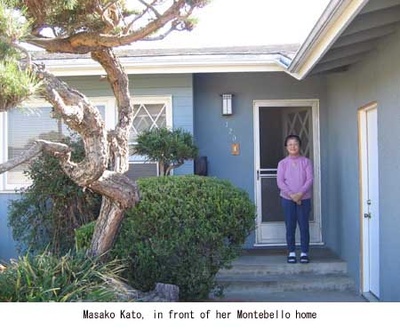Read Part 2 >>
After the war, Masako had left Japan to marry Kato Mitsuo, successor to the once prominent Daruma Café in Little Tokyo. However, just five years after her arrival in the US and despite the couple’s heavy investment into renovating the restaurant, they were run out of business by the property owner who designated the restaurant building for demolition for a city-wide redevelopment.
Thereafter, they opened a Japanese restaurant near their residence in Montebello for two years until Masako’s parents in Japan announced their plans to visit their daughter in America. Determined not to reveal the poor state of her lifestyle at the time, they closed down this restaurant as well.
As they were shutting down the restaurant, luckily, Mitsuo was hired at a company that made in-flight meals for United Airlines. He had been recruited by a friend.
“Back then they were still serving in-flight meals [for domestic flights], and the company was really short-handed, so his friend came asking for his help, saying, ‘Mitsuo, you’ve got to come!’ Normally, I’m sure he would’ve had to take some kind of test before getting hired, but he didn’t have to take one. He started working right there and then, so I took care of all the cleaning up for [the shutdown of] the restaurant.”
For 24 years until his retirement, Mitsuo continued to work at the airline meals company.
“We were lucky. Had we continued the restaurant, I’m sure we wouldn’t have had a pension. Benefits like that were very solid [at Mitsuo’s new job]. And since he was considered an employee of United Airlines, airfare was free for the entire family. It still is, so I’ve been able to make return trips to Japan several times.”
Masako and Mitsuo were blessed with four children. A year after their marriage in 1957, they had their first daughter, in ’59 their first son, in ’61 their second son, and in ’63 their second daughter. Each is two years apart, with two each of boys and girls.
“We had the kids attend Japanese school, but, unfortunately, the only one who can speak Japanese as fluently as people from Japan is my first daughter. She’s employed at Warner Brothers and is in charge of the Asian division, so she takes frequent trips to Japan.”
Unlike their glamorous past life, they were living a quiet and peaceful life until 1994 when Mitsuo was diagnosed with cancer and passed away.
“My husband retired before me, so he would say, ‘You should hurry up and retire too, so we can travel together all over the place.’ But, unfortunately, his wishes didn’t come true. After closing down the restaurant, I also had found work at a shrimp company. We were going to be able to travel for free thanks to United, but I had lost the most important part of it—Mitsuo.” Ten years have now passed by since her retirement.
When questioned, “Do you have any regrets for leaving Japan for the US?” she responded, “Well, I’d have to say that the reason why I’m able to live such an easygoing life right now is because I’m in America. The seven houses around mine are all occupied by Nikkei people. I’m at the end of a dead-end street, so during the summer, we pull out chairs and tents onto the street, and we enjoy something like a block-party. During those times, Archie Miyatake (son of T?y? Miyatake, known for his photographs documenting the Manzanar internment camp) from across the street would take pictures of everyone. And [no regrets] because my four children and my grandchildren—my precious family members are over here…”
Her children found work in fields unrelated to the restaurant business, but one of her grandchildren graduated from school in Pasadena and is now considering a path into the culinary arts.
“I’ve told him, if he’s really serious about it, he should definitely go to Europe to learn and train. Since his mother is Mexican and his father is Nikkei, his wish is to open up a Japanese-Mexican restaurant in the future.”
Lastly, I asked her about her current feelings toward her late husband. “I’m very appreciative of Mitsuo. He was truly a gentleman. I remember, after getting out of the car, he would always move quickly to the sidewalk to open the door for me. He had such wonderful manners like that.”
It seems that the memories of Mitsuo, whom she decided to marry the day they met, are still being held securely inside Masako’s heart.
© 2009 Keiko Fukuda






